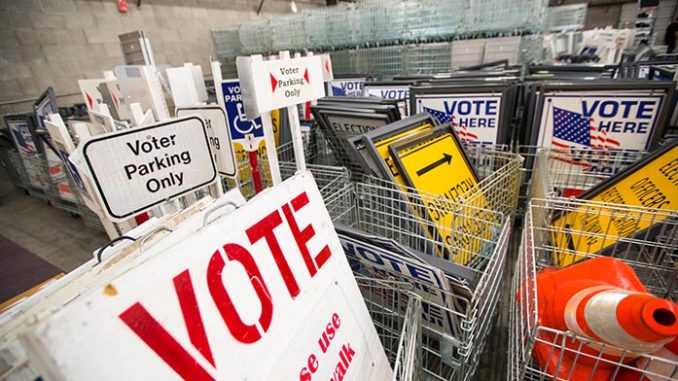
An attempt to get a voter initiative on the 2022 General Election ballot concerning a hodge-podge of changes to state laws involving voting rights, campaign finance, citizen measures, and lobbyist regulation has failed following an Arizona Supreme Court decision late Wednesday, according to the group which challenged the effort.
The Arizona Free Enterprise Club (AFEC) recently asked the Arizona Supreme Court to review a Maricopa County judge’s ruling in AFEC’s efforts to keep the Arizona Free Elections Act initiative off the ballot. The initiative seeks several unrelated changes to Arizona’s election laws which AFEC contends would have far-reaching negative impacts.
AFEC successfully argued to the Maricopa County judge last week that there were myriad deficiencies related to the circulators who collected petition signatures on behalf of a Democratic political committee called Arizonans for Free and Fair Elections (aka ADRC Action). That led to disqualification of roughly 97,000 of the 420,000 petition signatures submitted by ADRC Action.
The group is required to have at least 237,645 valid signatures to get the initiative on the ballot in November.
But the judge in Maricopa County denied AFEC’s argument that many of the circulators’ registration forms were missing suite or unit number on the organizing committee’s address and thus must also be disqualified.
On Wednesday, the Arizona Supreme Court came to a different legal conclusion, ruling that in this particular instance a suite or unit number was needed on the circulators’ registration forms. As a result, all of the petition signatures collected by the affected circulators must also be disqualified, the Decision Order states.
Breaking News, @azfec WON our lawsuit! The Arizona Supreme Court affirmed the lower court ruling that Free and Fair DID NOT gather enough lawful signatures to qualify their radical election initiative for the November ballot!
— Arizona Free Enterprise Club (@azfec) August 25, 2022
AFEC’s challenge highlighted the fact ADRC Action was attempting to change Arizona’s elections laws without actually complying with current laws to do so.
“This radical initiative imported 60 different provisions from Washington, D.C. that would have increased fraud, harmed small business, and empowered special interests,” AFEC President Scot Mussi said. “They spent over $7 million trying to buy their way onto the ballot, and they failed.”
But Chief Justice Robert Brutinel, who authored the Decision Order, addressed the fact that organizations like AFEC hit roadblocks this year when attempting to ensure ADRC Action and similar initiative supporters complied with state law.
Brutinel agreed with AFEC’s argument that circulators who collect signatures for more than one type of petition are required by state law to submit a registration application for each endeavor along with a new affidavit with each application. The problem, he acknowledged, is that Arizona Secretary of State Katie Hobbs never created an online system to allow circulators to submit more than one affidavit.
“By also refusing to accept manual submission of a hard copy affidavit…the SOS rendered it impossible for circulators to successfully submit a registration application as required” if they were already registered to circulate other petitions, the Decision Order stated.
The justices declined to hold ADCR Action or the individual circulators responsible for non-compliance “when the SOS has prevented such compliance.” Disqualifying the signatures collected by the impacted circulators in this specific case would “unreasonably hinder or restrict” the exercise of the initiative power under the Arizona Constitution, the decision stated.
But Hobbs could end up before the Supreme Court if the systems problem is not corrected. Wednesday’s decision stated the justices “anticipate that the SOS will remedy deficiencies in the submission of information through the Circulator Portal and accommodate the manual submission of required information in the interim.”
A more thorough written opinion as to the Arizona Supreme Court’s reasoning for its various findings will be issued “in due course,” according to the Decision Order.
READ MORE ABOUT THE LAWSUIT HERE
